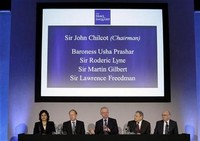Iraq Inquiry Says US and UK Planned Invasion in 2001
Foreign Office officials said they feared that United Nations sanctions against Iraq were losing support amid growing concern about weapons of mass destruction in 2001.

Sir Peter Ricketts, then chairman of the Joint Intelligence Committee, told the opening day of the inquiry that he was aware of a “background noise” of discussion in the United States about overthrowing the Iraqi regime after the election of President George W. Bush.
He said a review of the Iraq policy was already under way in Whitehall in anticipation of the arrival of the new Bush Administration, Times Online reports .
It was also reported, Sir William Patey, head of the Middle East department at the FCO, 1999-2002, told the inquiry: “In February 2001 we were aware of these drum beats from Washington and internally we discussed it. Our policy was to stay away from that.”
He explained Foreign Office policy at the time: “We didn’t think Saddam was a good thing, and it would be great if he went, but we didn’t have an explicit policy for trying to get rid of him.”
Simon Webb, director-general of operational policy at the Ministry of Defence from 1999 to 2001 and policy director from 2001 to 2004, said: “The question of regime overthrow was, I recall, mentioned but it was quite clear that there was no proposition being put in our direction on that.
"I wrote in my notes that ‘the dog did not bark’. I said it grizzled but it did not bark," Times Online reports.
News agencies also report, t his inquiry is about the political background to the British decision to go to war. It is supposed to say what lessons should be learned.
The Butler inquiry has already looked at the intelligence process. Butler concluded that there were failings and criticised the government for not highlighting warnings about the limits of intelligence in its September dossier on the threat allegedly posed by Iraq.
The official who wrote the memo concluded: "We should work on the assumption that the UK would take part in any military action. But we needed a fuller picture of US planning before we could take any firm decisions. CDS [chief of the defence staff] should tell the US military that we were considering a range of options."
Chilcot could take a very critical stance towards Mr Blair and his reply of 16 July, especially if it establishes that by then Mr Blair knew he was going to have the 23 July meeting and knew that it would be based not just on the likelihood that a war option would be pursued but that a war was now assumed.
But it could also fall back on a defence of Mr Blair by saying that he was correct in what he said and did not mislead, even if he did not say very much, BBC News reports.
Subscribe to Pravda.Ru Telegram channel, Facebook, RSS!





